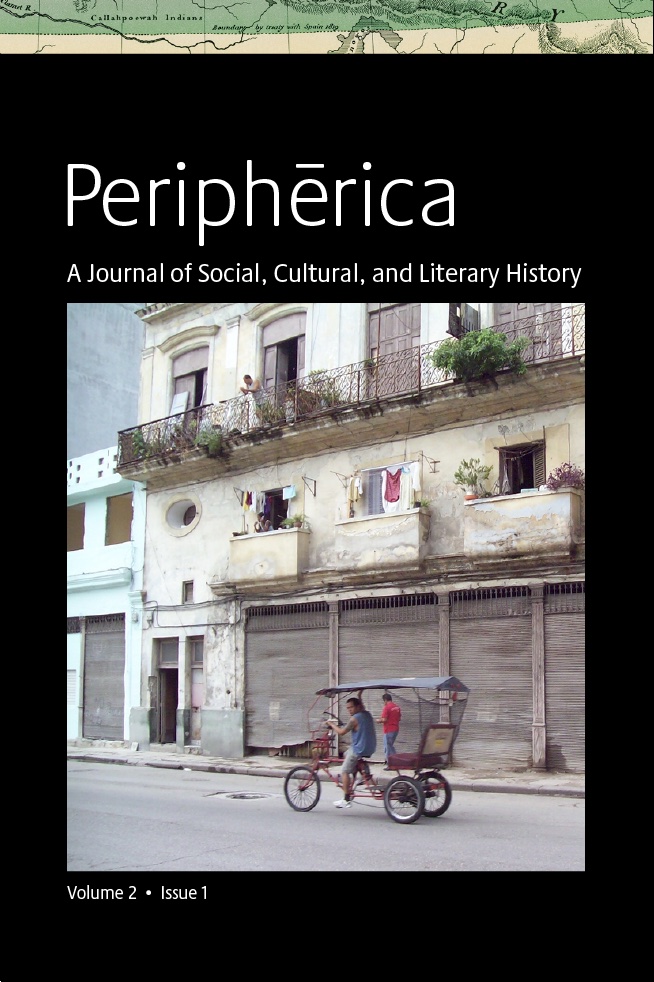The Tragedy of a Man Who Cursed: On Leonardo Padura's <i>The Novel of My Life</i> (2002)
DOI:
https://doi.org/10.5399/uo/peripherica.2.1.4Abstract
This article explores how in The Novel of My Life Heredia’s tragedy -that is forced exile- stems from a dynamics between colonialism and culture in Cuba. At the same time, this dynamics reveals the transatlantic concatenations between the imperial politics of Spain and the colonial character of nineteenth-century Cuba. Heredia’s tragedy, I argue, is depicted in Padura’s novel as a consequence of a socio-historical reality in which Heredia’s enlightened, or liberal, ideas about politics and independence where rather “misplaced ideas” in the Cuba of the 1820s. In other words, some of these European liberal ideas became “misplaced ideas” when they were displaced first to the Spanish context, and subsequently to the colonial context in Cuba. The incongruences between the political structures and culture of the Spanish dynastic state and enlightened European ideas reflected themselves on colonial Cuba.References
Alternberg, Tilmann. Melancolía en la poesía de José María Heredia. Iberoamericana Vervuert, 2001, pp. 197-206.
Anderson, Perry. “La naturaleza y el sentido de la guerras hispanoamericanas de liberación.” La cuestión colonial. , editado por Heraclio Bonilla, Universidad Nacional, 2011, pp. 33-48.
Breña, Roberto. El primer liberalismo español y los procesos de emancipación en América. Una revisión historiográfica del liberalismo hispánico. El Colegio de México, Centro de Estudios Internacionales, 2006, pp. 175-361.
Duprey, Jennifer. The Aesthetics of the Ephemeral: Memory Theaters in Contemporary Barcelona. SUNY University Press, 2014, pp. 1-18.
Elliot J.H. Spain, Europe and the Wider World 1500-1800. Yale University Press, 2009.
Fernández Retamar, Roberto. “Caliban: Notes towards a Discussion of Culture in Our America.” The Massachusetts Review, Vol. 15, No. 1-2, Winter-Spring, 1974, pp. 7-72.
Ferrer, Ada. Freedom’s Mirror. Cuba and Haiti in the Age of Revolution. New York: Cambridge University Press, 2014, pp. 1-43.
Gott, Richard. Cuba: A New History. Yale University Press, 2004, pp. 1-10 and 39-70.
Hobsbawm, Eric. The Age of Revolution 1789-1848. Abacus, 2010, pp. 19-41.
Johnson Adriana. “Reading Roberto Schwarz: Outside Out of Place Ideas.” Journal of Latin American Cultural Studies: Travesía, vol. 8, no. 1, 2009, pp. 21-33.
McClelland, IL. Ideological Hesitancy in Spain 1700-1750. Liverpool University Press, 1992, pp. 138-146.
Ortega, Francisco. “Colonia, nación y monarquía. El concepto de colonia y la cultura política de la independencia.” La cuestión colonial, editado por Heraclio Bonilla, Universidad Nacional, 2011, pp. 109-134.
Padura, Leonardo. La novela de mi vida. Tusquets Editores, 2002.
-----. José María Heredia: La patria y la vida. Ediciones Unión, 2003, pp. 1-46.
Pérez, Joseph. “Las luces y la independencia de Hispanoamérica.” España y América: entre la Ilustración y el liberalismo, editado por Joseph Pérez y Armando Alberola, Colección de la Casa Velázquez, no. 44, 1993, pp. 69-76.
Pérez, Louis A. Cuba: Between Reform and Revolution. Second Edition. Oxford University Press, 1995, pp. 21-69.
-----. The Structure of Cuban History. University of Carolina Press, 2013, pp. 1-20.
-----. Slaves, Sugar, and Colonial Society. Travel Accounts of Cuba 1801-1899. Scholarly Resources Inc., 1992, pp. 225-248.
Premo, Bianca. The Enlightenment on Trial. Ordinary Litigants and Colonialism in the Spanish Empire. Oxford University Press, 2019, pp. 1-30.
Ruiz Torres, Pedro. Historia de España: Reformismo e Ilustración. Vol. 5, dirigida por Josep Fontana y Ramón Villares, Marcial Pons, 2008, pp. 202-252.
Sader, Emir. “El desarrollo manifiesto de ser colonizado.” La cuestión colonial, editado por Heraclio Bonilla, Universidad Nacional, 2011, pp. 621-628.
Schwarz, Roberto. Misplaced Ideas: Essays on Brazilian Culture. Verso, 1992, pp. 19-32.



